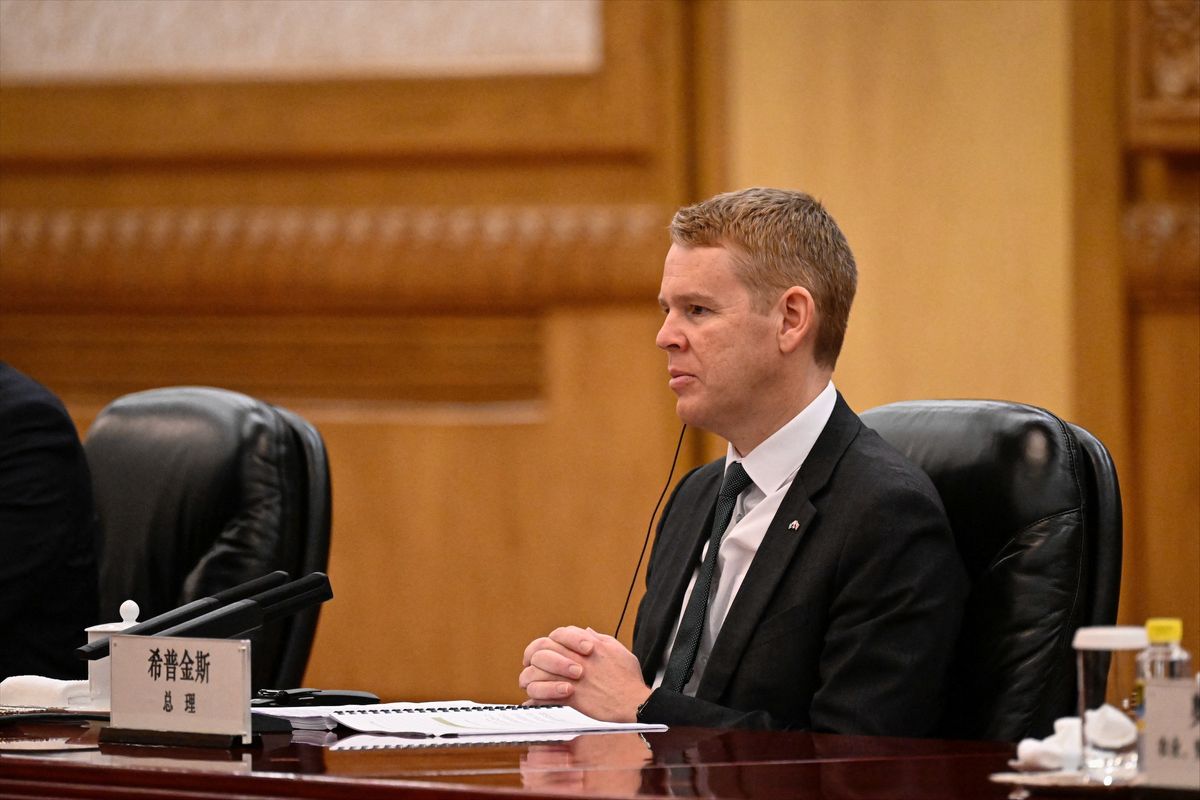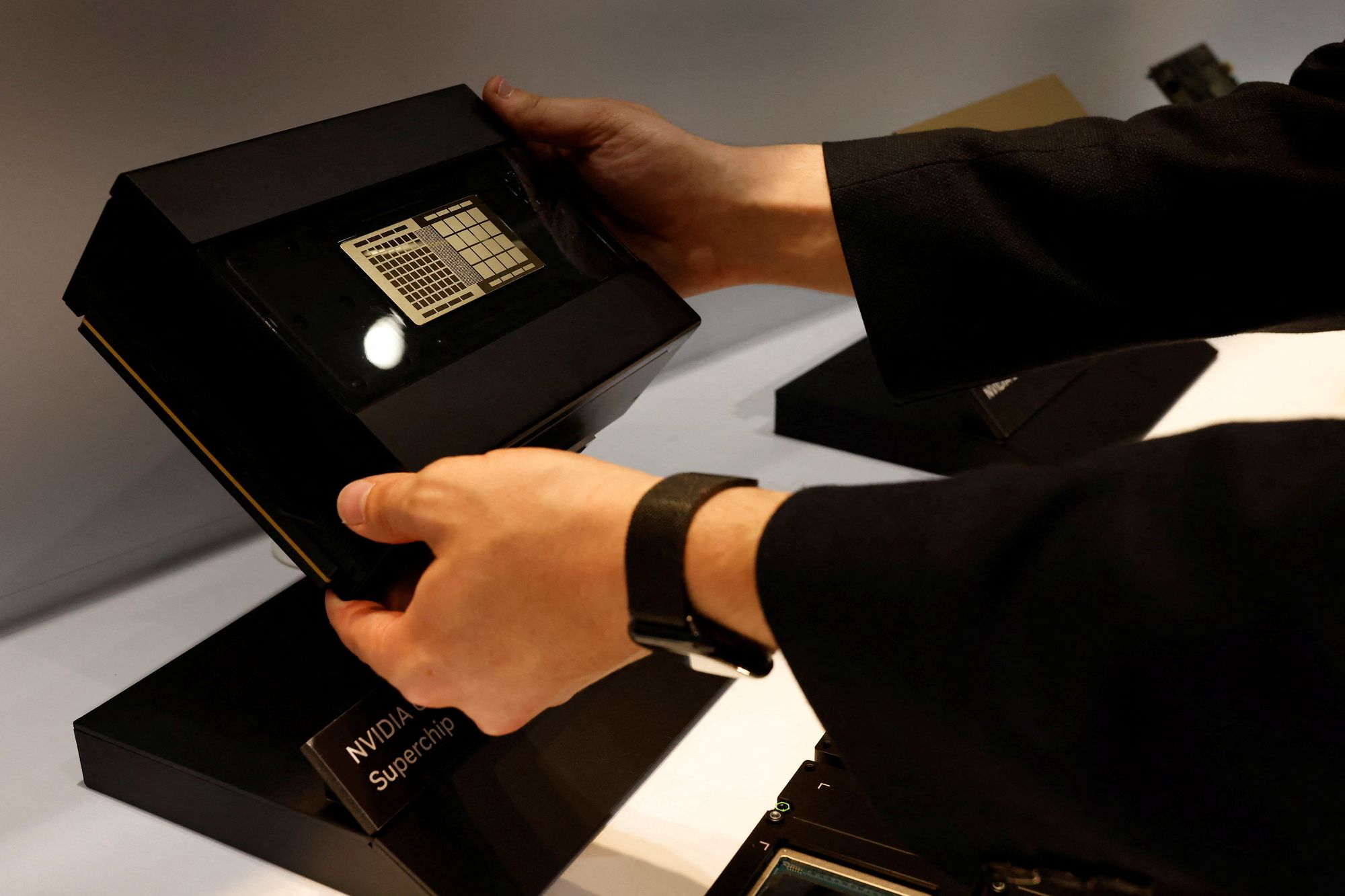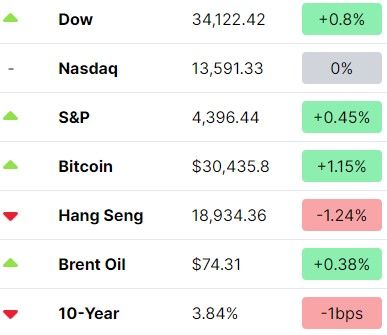From New Zealand and China boosting ties to a super speedboat – Here are today's Headlines
New Zealand's Prime Minister Chris Hipkins just visited China, and the two countries made some major agreements together to boost their economic cooperation.

A few minutes every morning is all you need.
Stay up to date on the world's Headlines and Human Stories. It's fun, it's factual, it's fluff-free.
To start off, we're looking into:
China-New Zealand trade relations
The backstory: There's this agreement called the Comprehensive and Progressive Agreement for Trans-Pacific Partnership, or CPTPP for short. It's a pretty exclusive club – to become a member, a country needs the approval of all the existing members. Some of the current members include Canada, New Zealand, Australia and Japan.
China has also shown interest in joining the CPTPP, submitting its application in September 2021. China also applied for membership in another agreement called the Digital Economy Partnership Agreement (DEPA) a few months later. But, some countries haven't supported the applications, namely Australia.
The development: New Zealand's Prime Minister Chris Hipkins just visited China, and the two countries made some major agreements together to boost their economic cooperation. New Zealand openly supported China's participation in both the CPTPP and DEPA. Click the link here for more.
The EU challenges data policies

The backstory: As tech becomes more advanced, world governments are playing catch-up in attempts to limit the ways that user data is being shared. The EU, specifically, has become really concerned over the ways data is being taken from users through their devices and used by corporations. In 2018, it passed the General Data Protection Regulation (GDPR), which pushed for more transparency in how user data was being used. The EU has been working on a series of legislation pieces to build up its digital strategy. In 2022, it passed the Digital Markets Act (DMA) and Digital Services Act (DSA).
The development: The European Parliament and Council of the EU have just reached a provisional agreement on a new Data Act, which is supposed to regulate how user data can be used and accessed in the EU. The idea is to give EU users more control over their digital data. Click the link here for more on this new legislation.
More US chip export curbs?

The backstory: Last year, the US put some controls on exporting advanced microchips and the equipment to make them to China. The idea was to slow down China's progress in supercomputing, especially for things like nuclear weapons and AI (like Open AI's ChatGPT).
More recently: Last September, US officials told Nvidia to hold off on exporting certain powerful computing chips to China. This affected its two most advanced chips, the A100 and the newer H100, primarily. But the company then created alternative versions of these that would still qualify to be exported to Chinese companies.
The development: The Biden administration is reportedly getting ready to tighten the rules on selling even those modified chips to China, according to The Wall Street Journal. Click the link here for more.
To end, we'll look into:
25-year-old consciousness debate settled

In 1998, two scholars – computational neuroscientist Christof Koch and philosopher and cognitive scientist David Chalmers – got into a pretty involved discussion about human consciousness. They were arguing over how the brain generates subjective conscious states.
So, Koch ended up betting Chalmers a case of wine that the mechanism that sparks a brain’s neurons to produce consciousness would be discovered by 2023. And, at the annual meeting of the Association for the Scientific Study of Consciousness (ASSC) in New York City this June, Chalmers was declared the winner. Cheers.
We’re still in the dark about consciousness 25 years later.
Click the link here for more.
In other news ...
🔢Numbers:

📉Market snapshot and key quotes:
- In the US: The Dow Jones and S&P 500 went up, while the Nasdaq Composite held steady on Thursday. The major banks that passed the Fed's stress test were the driving force behind this positive performance. This reassuring news and an upward revision in the GDP figures helped ease concerns about a looming recession on Wall Street.
- In Hong Kong: Hong Kong stocks took a hit after Fed Chair Jerome Powell's comments on raising interest rates to tackle inflation and more swirling concerns about a lack of a big government stimulus.
📊Top gainers/losers and company news:
- In the US: The banking sector had a good day, with JPMorgan Chase rising by 3.5% and Goldman Sachs jumping by 3%, while Wells Fargo jumped by 4.5%.
- On the flip side, Micron dropped 4.1%. Despite reporting better-than-expected revenue of US$3.75 billion, the company expressed concerns about its operations in China. The restrictions imposed by the Chinese government on certain product purchases created uncertainty and volatility.
- In Hong Kong: Alibaba dropped by 2.6%, JD.com slid by 3.7%, and Baidu fell by 4.2%. Sportswear maker Li Ning also dropped 6.2%, while Anta Sports tumbled 4.7%.
- Swire Pacific gained 4.4% after the company made headlines by selling its entire US soft drinks business for a staggering HK$30.4 billion (US$3.9 billion) to its UK-based parent company.
👀The numbers everyone is watching:
- In the US: The first-quarter GDP figures received a significant upward revision, reflecting stronger growth. The Commerce Department adjusted the first-quarter GDP higher to 2% growth from the initial estimate of 1.3%.
- Meanwhile, weekly jobless claims fell to 239,000, the lowest level since May, beating economists' expectations of 265,000 claims
📅To check out our economic calendar for this week, click here.
More headlines ...
📢Protests in France: On Tuesday morning, a video began circulating online showing French police shooting 17-year-old Nahel M. (ethnically French-Algerian) during a traffic stop when he tried to drive away. Reacting to this video, mass protests have sprouted all over France two days in a row, resulting in some violent clashes with police. While the cops have admitted that the officer shouldn’t have used his gun and have put him under investigation, this incident has sparked a national conversation about racism and police brutality.
🚓Is Russia arresting top generals?: After the Wagner revolt in Russia, the world has been watching how the Russian government will move forward. Recently, it was reported that General Sergei Surovikin, a senior commander in the war, knew that Wagner would rebel in advance. On Thursday, it was confirmed that Surovikin had been arrested, but there aren’t a lot of details on exactly what’s going on or where he’s being held.
💬World reacts to Swedish Quran burning: Yesterday, we reported that someone had gotten a permit to burn the Quran outside of a mosque in Stockholm. Several Muslim-majority countries have now come forward to condemn the act. And, on Thursday, dozens of people stormed the building hosting the Swedish embassy in Iraq's capital, Baghdad, following an angry protest. They walked into the building and stayed there for about 15 minutes before security forces got them out.
📄EU summit affected by Wagner mutiny: The EU began a summit on Thursday, but the official agenda was impacted by the Wagner situation in Russia. NATO chief Jens Stoltenberg and Ukraine President Volodymyr Zelenskiy both mentioned how the mutiny shows some of Russia’s weaknesses and its internal division.
👩⚖️China announces Foreign Relations Law: China has seen countries in the West put into place certain export controls on tech goods and roll back trade with some Chinese suppliers in an effort to quash China’s development in those sectors. On Wednesday, China passed a new foreign policy law that outlines its right to make “countermeasures” against foreign actions it sees as a threat.
🙋♂️Cambodian leader ditches Facebook: Cambodian PM Hun Sen is a noted user of Facebook, known for posting everything from photos of his grandchildren to political threats. Now, he’s moving from Facebook to the blogging network Telegram, which he says is better for communicating, especially when he’s in countries without Facebook, like China.

📄Amazon faces antitrust lawsuit: The US Federal Trade Commission has filed three antitrust lawsuits against Amazon, and it’s getting ready to file the biggest one yet. This new antitrust suit would focus on Amazon’s online marketplace specifically. The main complaint is expected to show that Amazon rewards merchants who use its logistics services and suppresses those who don’t.
💰EU proposes a digital Euro: The EU’s central bank has been working on pushing the Euro into the digital space, saying it could be a potential new central bank digital currency (CBDC). But many people and organizations are skeptical of the idea, not quite trusting the security and possible benefits of the scheme. On Wednesday, the European Commission published plans to move forward with this digital currency.
👩🚀Volunteers head into Mars simulation: A while ago, we shared some info on a Mars simulation base that NASA has been building here on Earth, trying to replicate Martian conditions to see how humans would do on the red planet. On Sunday, NASA locked the first volunteers for this mission in the Mars habitat, where they’ll stay for 378 days. Over this time, scientists will be measuring the impacts of “Mars life” on the health and performance of the volunteers.

💉Potential TB vaccine: Tuberculosis is a destructive disease that kills 1.6 million people every year, impacting developing countries the most. While we have a vaccine already that protects children against the bacteria causing the disease, it’s not very helpful for adults. Now, a new TB vaccine candidate is making waves, with US$550 million of funding being poured into its last phase of clinical trials. If all goes well, it could be the first new TB vaccine on the market in more than 100 years.
🚀Virgin Galactic in space: Virgin Galactic, yes the same Virgin owned by Richard Branson, has flown its first paying customers to space. Italian Air Force officers broke out their nation's flag as the aircraft known as Galactic 01 headed into space, nearly 84 kilometers above sea level. This flight comes almost two years after Branson’s initial test flight. The company has faced some setbacks following that first flight, but it looks like things are back on track.
🎨Caught red-handed: In Helsinki, Finland, Deputy Mayor Paavo Arhinmäki could be facing some legal trouble. Last weekend, he was caught spray-painting graffiti in a train tunnel. Cleaning up that graffiti cost the city €3,500 euros (US$3,830), and some people are calling on Arhinmäki to pay damages and resign from his position.

🚤Porsche speedboat: Ever wanted to blast across the water in ultimate style without leaving an environmental footprint? Well, about a week ago, Porsche announced that it would be releasing a new electric speedboat. The Frauscher x Porsche 850 Fantom Air was announced, but not much has been released about it. One thing we do know, it’s going to be expensive – clocking in at around US$655,000. Also, if you are one of the first 25 people to buy the boat, you’ll be one of the only ones to have the exclusive special first edition model. Fancy!

Enjoying our TMS Headlines?
Forward it to a friend! After all, sharing is caring.
Anything else? Hit reply to send us feedback or say hello. We don't bite!
Written and put together by Joey Fung, Vanessa Wolosz, Caleb Moll and Christine Dulion




Comments ()